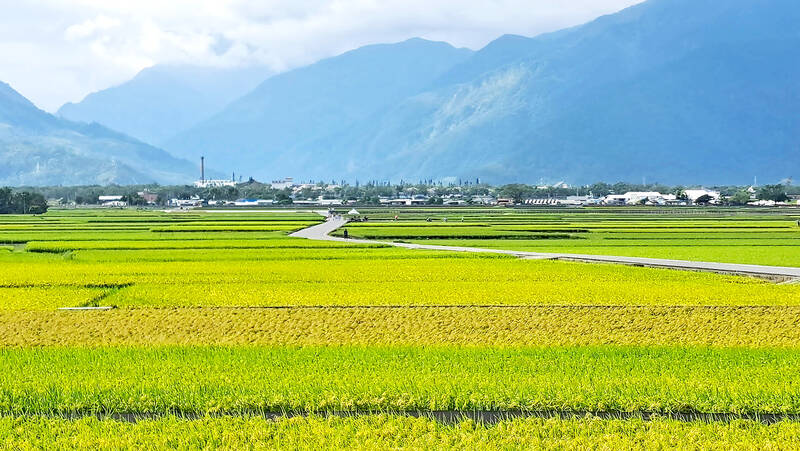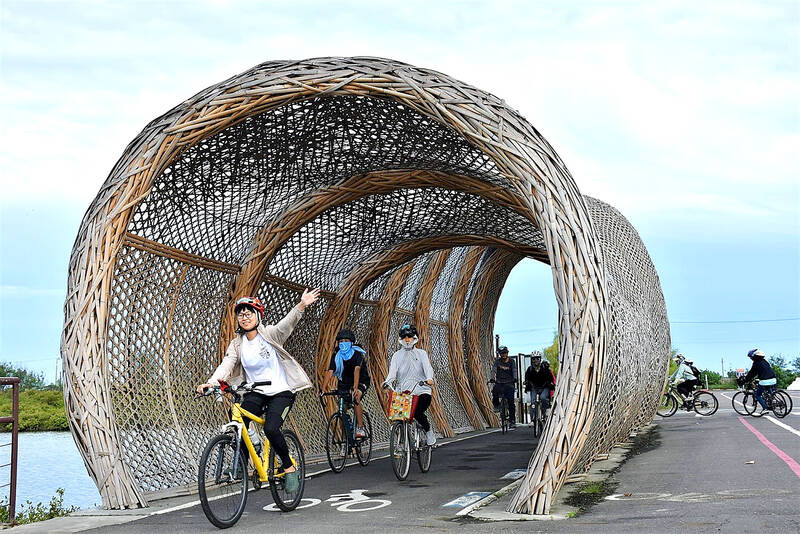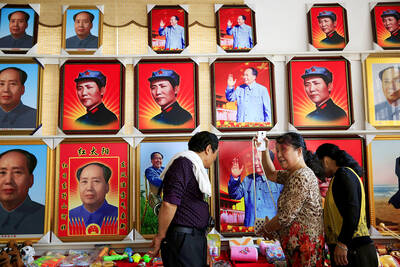Late last month the Executive Yuan approved a proposal from the Ministry of Labor to allow the hospitality industry to recruit mid-level migrant workers. The industry, surveys said, was short 6,600 laborers. In reality, it is already heavily using illegal foreign workers — foreign wives of foreign residents who cannot work, runaways and illegally moonlighting factory workers.
The proposal thus merely legalizes what already exists. The government could generate a similar legal labor supply simply by legalizing moonlighting and permitting spouses of legal residents to work legally on their current visa. But after 30 years of advocating for that reform, I am well aware the government will never do anything so rational.
Demand for labor in the tourism industry would be much greater, but Taiwan’s tourism industry is moribund, likely to fail to reach the government’s announced goal of 9 million visitors from abroad, that itself is a reduction from the originally hoped-for 12 million in 2023. The domestic tourism industry is seeing increases, but the Tourism Administration said that most trips are day trips, and there is little travel on weekdays.

Photo: Huang Ming-tang, Taipei Times
BOSS CULTURE
The lack of travel on weekdays is a reminder of how Taiwan’s boss culture shapes its society. More flexible work arrangements would boost tourism on weekdays. The lack of remote working arrangements, flex time, four-day work weeks and other reforms common in more productive societies is a relic of the belief of Taiwan’s bosses that work should not only be performed, but must be seen to be performed. The result is not more work, merely more performance of work.
In addition to the lack of time to travel, the domestic tourism industry suffers because Taiwan’s bosses pay too little. Singaporean transplant Roy Ngerng (鄞義林), one of the sharpest observers of Taiwan’s economic disparities, essayed at Ketagalen Media this week on Taiwan’s wage situation in comparative focus. Among countries with a GDP per capita and cost of living similar to that of Taiwan (Spain, Slovenia and Japan), he notes, monthly median wages were the equivalent of NT$80,000 in 2023.

Photo: Yang Chin-cheng, Liberty Times
“However Taiwan’s median wage was much lower — at only NT$46,667, or only about 60 percent that of theirs (and 70 percent that of Slovenia’s),” he calculates.
Recall that most workers in Taiwan earn less than the median wage.
Suppressed local demand for tourism leads to low wages in the local tourism industry, leaving it short of labor. It also leads to underinvestment in tourism resources, such as the stunning lack of development of trekking and other tourism activities in Taiwan’s insanely gorgeous mountains.
Ngerng observes that in the last eight years, when the previous administration was boosting minimum wages, Taiwan’s minimum wage grew roughly NT$7,500, pushing similar growth for its median wage. However, minimum wages in Slovenia, South Korea and Spain grew NT$16,000 to NT$20,000 over the same period, leading to median wage growth 2-3 times as great as Taiwan’s. Over that same period, he finds, Poland and Lithuania saw their minimum wages grow from 70 percent of Taiwan’s to 30 percent greater than Taiwan’s. That is before Taiwan’s crazed housing prices reduce the purchasing power of wages even further.
Like many observers, including this writer, Ngerng calls upon the Democratic Progressive Party (DPP) to enact a program to raise wages dramatically over the next few years. His call was echoed last week by Wu Jieh-min (吳介民), a distinguished research fellow at Academia Sinica’s Institute of Sociology. Wu told a conference organized by the Koo Kwang-ming Foundation that the growing wealth gap in Taiwan is creating voters who “hate” the DPP, creating a “hotbed” for populism, as this paper reported. This observation has been made several times in recent years by Taiwan observers.
According to a report in this paper of Wu’s remarks, the richest 20 percent of households in Taiwan held 66.9 times more wealth than the bottom 20 percent as of the end of 2021, according to the Directorate General of Budget, Accounting and Statistics. In 1991, those households held just 16.8 times more wealth. A much greater share of the economy went to paying wages, as well.
POPULISM
Wu put his finger on the way low wages drive populism: if Taiwan Semiconductor Manufacturing Co (TSMC) and its peers are performing so well, Wu asks, why are Taiwan’s science parks “full of engineers who hate the DPP and support the Taiwan People’s Party (TPP)?” Each year, even workers in highly paid positions — who are well aware they make less than peers in comparable economies — feel that they are struggling more and more.
Low wages are a threat to Taiwan’s political stability and to its resistance to occupation by the People’s Republic of China (PRC). Low wages also suppress birth rates. Very obviously, the DPP has decided it will take little effective action to addresses these crises, all of which are a mortal threat to the nation’s future as an independent, democratic polity. Naturally, the Chinese Nationalist Party (KMT) and People’s First Party (TPP) will take no action, since voter anger at the DPP only helps them. As the behavior of the TPP shows, populist votes are votes for Beijing.
Taiwan’s political elites may ignore their own people’s complaints, but they are highly sensitive to international criticism. The CNN report on Taiwan’s “pedestrian hell” caused the government to make meaningful change in the way traffic works, and in transportation infrastructure. In Taichung, for example, the government began constructing street corners designed to give pedestrians a better view of oncoming traffic. The September report of the US customs hold on Giant bicycle imports, ostensibly due to Giant’s treatment of migrant workers, generated not only a local conversation, but changes in the way Giant handled its migrant workers. Small steps to be sure, but still progress.
Similarly, international media reporting on Taiwan’s low wages, long working hours and low tax take might well cause enough embarrassment to drive change, especially if it originates from a major news outlet and is connected to Taiwan’s rising populism, talent shortages and low defense spending. US-based commentators might also think about mentioning these issues in their criticisms of Taiwan’s low defense spending. A politically-divided Taiwan, rife with populist discontent, does not serve US interests.
The opening of the hospitality industry to legal migrant workers highlights another aspect of the migrant labor issue: the way migrant workers are used to hold local wages down. One obvious impact is that low wages for one group hold down wages for all. But the new regulations stipulate that hospitality businesses must first give Taiwanese workers a NT$2,000 a month raise. As Ngerng has demonstrated above, this is far below what is necessary to bring Taiwanese wages up to the level they should be at.
A key source of migrant worker resentment is this wage differential. At factories and businesses across Taiwan, migrant workers can see they are paid less for doing the same work as locals. Locals can see that too. It helps Taiwanese workers accept their lower pay. As US President Lyndon Johnson once put it, convince a fellow from the majority that he is better than the best of the minorities, and “he won’t notice you’re picking his pocket. Hell, give him somebody to look down on, and he’ll empty his pockets for you.”
Elite indifference? Low wages? High home prices? Lurking feelings of superiority? That’s a recipe for populist anger.
Notes from Central Taiwan is a column written by long-term resident Michael Turton, who provides incisive commentary informed by three decades of living in and writing about his adoptive country. The views expressed here are his own.

Taiwan can often feel woefully behind on global trends, from fashion to food, and influences can sometimes feel like the last on the metaphorical bandwagon. In the West, suddenly every burger is being smashed and honey has become “hot” and we’re all drinking orange wine. But it took a good while for a smash burger in Taipei to come across my radar. For the uninitiated, a smash burger is, well, a normal burger patty but smashed flat. Originally, I didn’t understand. Surely the best part of a burger is the thick patty with all the juiciness of the beef, the

This year’s Miss Universe in Thailand has been marred by ugly drama, with allegations of an insult to a beauty queen’s intellect, a walkout by pageant contestants and a tearful tantrum by the host. More than 120 women from across the world have gathered in Thailand, vying to be crowned Miss Universe in a contest considered one of the “big four” of global beauty pageants. But the runup has been dominated by the off-stage antics of the coiffed contestants and their Thai hosts, escalating into a feminist firestorm drawing the attention of Mexico’s president. On Tuesday, Mexican delegate Fatima Bosch staged a

The ultimate goal of the Chinese Communist Party (CCP) is the total and overwhelming domination of everything within the sphere of what it considers China and deems as theirs. All decision-making by the CCP must be understood through that lens. Any decision made is to entrench — or ideally expand that power. They are fiercely hostile to anything that weakens or compromises their control of “China.” By design, they will stop at nothing to ensure that there is no distinction between the CCP and the Chinese nation, people, culture, civilization, religion, economy, property, military or government — they are all subsidiary

Would you eat lab-grown chocolate? I requested a sample from California Cultured, a Sacramento-based company. Its chocolate, not yet commercially available, is made with techniques that have previously been used to synthesize other bioactive products like certain plant-derived pharmaceuticals for commercial sale. A few days later, it arrives. The morsel, barely bigger than a coffee bean, is supposed to be the flavor equivalent of a 70 percent to 80 percent dark chocolate. I tear open its sealed packet and a chocolatey aroma escapes — so far, so good. I pop it in my mouth. Slightly waxy and distinctly bitter, it boasts those bright,